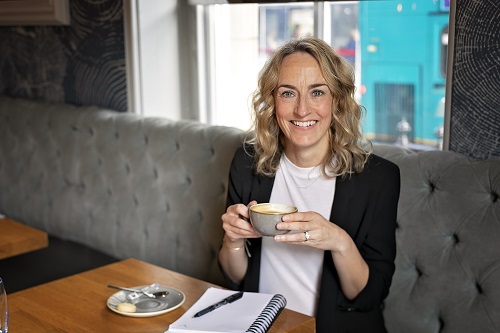 Guest Post – 9 Elements To Building A Fulfilling Relationship By Sakina Ballard (above)
Guest Post – 9 Elements To Building A Fulfilling Relationship By Sakina Ballard (above)
Many of us want to be in relationships, as humans we understand ourselves through our interactions with others, but living intimately and closely in a partnership with others can be challenging.
Each of us have our own unique experiences and expectations that we bring to our relationships, often ideas and beliefs that are outside our conscious awareness. When we meet these same subconscious ideas in others, we can find ourselves struggling and distanced in the very relationships we are wanting to build trust in.
The Spark
Sometimes the challenge is keeping that spark going as our relationships undergo change or stress, such as having children, moving jobs or healing aspects to our own lives.
Love is a tricky thing to define. It can mean so many things to each individual but my favourite definition is by M. Scott Peck in his book ‘The Road Less Travelled’ where he states “love is the exiting of oneself for oneself or another”.
Developing ourselves and our relationships if we believe they are healthy for us, can be an act of love. It can take us to new places within ourselves and offers others the best of ourselves, as we do that we feel a catalyst of change.
Here are some ideas to create more fulfilment in the most intimate relationships we have in our lives.
Be Clear In Your Expectations
We all bring expectations to situations and relationships. Sometimes we are aware of what we are looking for, and are able to achieve it with clarity. At other times, we act through subconscious thoughts and actions learned from our upbringing and life experiences with less fruitful outcomes. In relationships we can anticipate that our partner shares our expectations but that is not necessarily the case.
We should take time to figure out what we really want from our relationships. When we recognise that something might be going wrong, it’s better to communicate and actively seek change rather than just point out what we don’t want the other person to be doing.
Wherever you are in your relationship, getting clear on expectations for the future is useful, not just on life’s major items like marriage, children, finances, travel and parenting, but the smaller day to day things as well. Find out and ‘check in’ with each other as your relationship changes and progresses.
Take Care of Your Emotional Needs
A relationship is about 2 people coming together and supporting themselves and each other. We each have emotional needs, it’s good to know what ours are so we can keep them topped up. It is also important to know which can be met in our relationship and which need to be met outside through friends, work, hobbies etc.
Having a good base of knowing what our own emotional needs are is a great foundation to being a fulfilled person within a relationship. Aspects of emotional needs include being heard and respected and feeling like we have status and privacy. The level to which these needs are being met evolve over time with each and every life change, so it’s good to regularly check in and reassess.
Get Support to Understand Your Relationship
Most of us turn to friends for support when our relationships feel challenging. Often we end up sharing the same stories or woes about our partners and don’t make much headway in moving forward.
Asking our friends to help us frame our thoughts and untangle any areas that feel stuck can be really useful and supportive as we work through our own thoughts and frustrations. However, sometimes going to a neutral space can be more suitable.
Relationship counselling can be a brilliant way to work through difficulties and adjustments that relationships go through. Giving a safe space to express, listen and be heard, which when things feel strained and stuck can be invaluable to get communications moving again.
If a relationship counsellor feels unachievable for financial reasons, books can be a really useful resource; Relate have a series that you can work through together with your partner and can be more affordable and accessible than private counselling and there are great resources such as 5 Love Languages referenced below.
Know Both of Your Love Languages
We may have a lot of love to give and being in relationships is certainly also about receiving love in return. We each have a way we like to receive love; our own love language, whether it be through acts of service, words of affirmation, touch, receiving gifts or quality time.
Find out what yours are and what your partners are. Then fill each other’s cups with this love language whenever you can so you can revive love in a way that feels meaningful to you and can give your affection in a way that if felt by your partner.
Giving and receiving in this way can feel more impactful and nourishing when are looking to elevate your relationships.
Communication is Key; Talking and Listening
Communication is such an important aspect of a good relationship and it is a two-way street; talking but also listening to each other without judgement.
Understanding each other is key to helping stay connected and not develop resentments.
Taking turns to talk and being disciplined about holding that time greatly helps. Having set ‘scripts’ to follow such as ‘I feel… when … happened’ can also aid discussions.
Over time we change, so do our partners and so does our life together. There are events along the way such as pregnancies, losses, career changes. Being able to navigate these changes within our relationship requires the ability to be able to make sense of our own journey, express it to our partners and also listen to their journey and understand them.
Empathy and Compassion
These are key areas in mindfulness and are very important in relationships. None of us are perfect and no relationships is without its difficulties. Navigating other people’s lives whilst simultaneously experiencing our own is an ongoing challenge. Throw into that a life and all its changes and it’s easy to feel resentments and disappoints building up and becoming the narrative we tell ourselves and find evidence for in our relationships.
If we can start to bring some empathy and compassion to ourselves and our journey it can be easier to allow ourselves to become trusting and vulnerable to be able to reduce our reactive and defensive behaviour and make more space for responding and care.
Have Fun Time Together
When things are tense, spending time together can feel like a double ended sword. It’s much wanted but things can descend into usual dynamics and conflict so make a conscious effort to have fun on a date night or once a week. If there are any areas of concern, raise them at another time and maybe discuss what that time will be so neither of you feel ambushed.
Enjoy leisure time together as it’s important to remind yourself of the good times you can have together and create spaces where you both have an experience of each other positively and at the optimum of your relationship. Making these a conscious effort can be the starting point for letting these grow.
Intimacy
Intimacy is one of the most important parts of the relationship with your partner. A physical way of expressing love and developing deep trust.
Intimacy isn’t the same as sex and can happen in various ways but it’s much easier to create a sexually fulfilling relationship when intimacy is nurtured.
Intimacy can be daily, a passing kiss, sitting and talking at the end of a day, taking a shower together or a cuddle and dance whilst washing up.
Building bonds and trust through intimate acts can create a deeper relationship and one that feels more exciting and adventurous too.
Be Spontaneous in The Everyday Routine
Relationships can be fun and fresh even 15 years in. It does take a conscious effort to create this but there are spaces in every relationship for thoughtful and unexpected gestures.
A bunch of flowers, a note in the work bag, celebrating special dates together, a loving text in the middle of the day or a candle-lit meal, all just because you can and the difference small gestures make to the giver and receiver is affirming many times over.
Spontaneity is about having fun, enjoying ourselves, and giving our relationships the creative moments it deserves.
Final Thoughts
A long term relationship is an ongoing changing process, there are highs and lows, changes, adjustments stresses and joys. Riding the wave of life alongside another person requires us to look after ourselves and extend our awareness and care to another and receiving the same in return can be fulfilling and enjoyable.
This quote by Rumi sums up the path to a peaceful and fulfilled relationship:
“Out beyond ideas of wrongdoing and right-doing there is a field. I’ll meet you there. When the soul lies down in that grass, the world is too full to talk about.”― Rumi
Bio
Sakina is a mum of 2 and founder of Tranquil Birth. Having negotiated many changes in her relationship as she embarked on personal growth and adjusting to having children. She shares her journey through Instagram on @tranquilbirth and her personal account @acacia.woman.
Further reading and references –
The Road Less Travelled by M. Scott Peck
The 5 Love Languages by Gary Chapman
Men are from Mars, Women are from Venus by John Gray
Relate Book Series available on Amazon
Codependent No More by Melody Beattie

 Guest Post – 9 Elements To Building A Fulfilling Relationship By Sakina Ballard (above)
Guest Post – 9 Elements To Building A Fulfilling Relationship By Sakina Ballard (above)







Every relationship has loopholes & some gap. They should be fulfilled timely to keep the relationship live for a longer time.
Yes they should be addressed as soon as possible otherwise it can become a bigger issue. Thanks for your comment.
Thanks for sharing. Love alway beautiful.
ness recently posted…What are the Best Teak Wood Alternatives for Outdoor Furniture?
I like the way you write, I was having bad times in my long distance relationship, I wish these tips will be helpful for me. Thankyou.
Helpful tips in building connect wth my girlfriend. Also has immense help from great spell caster
https://sandton-psychic.co.za/